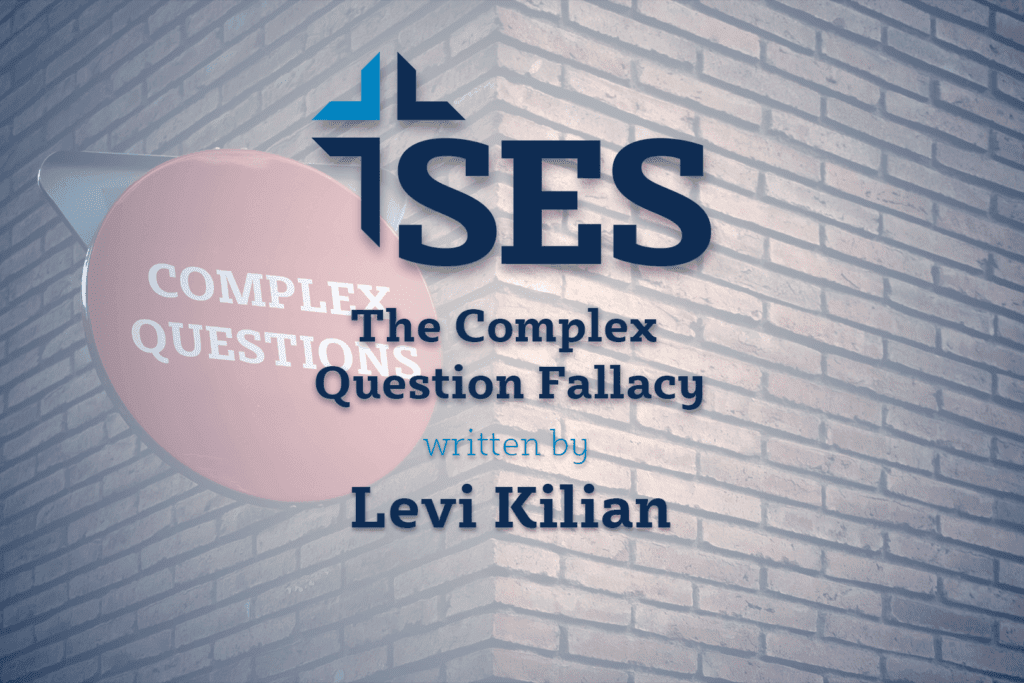Defining the Fallacy
Even if you don’t know its technical name, you’re probably familiar with the complex question fallacy. Variations of the fallacy are also known as ‘gotcha’ or ‘loaded’ questions. Complex questions often artificially restrict the type of responses that can be given and usually presuppose something with which not everyone in the discussion may agree. The fallacy is usually committed by (either accidently or intentionally) smuggling an unjustified assumption or unsettled question into the question itself. Let us look at a few examples.
Examples of the Fallacy
The classic example of the fallacy is “Have you stopped beating your wife?” If one treats this as a legitimate question, the recipient can only answer “Yes” or “No.” As Peter Kreeft observes, the recipient is left in a condemned to perdition if you do and condemned to perdition if you don’t type situation.¹ If he says “No,” the implication is that he still beats his wife. If he says “Yes,” then the implication is that he at some time in the past beat his wife. However, the question begging to be asked is “Have you ever beaten your wife?” This is the question behind the question, and if the answer to this question is “No,” then the question, “Have you stopped beating your wife?”, is illegitimate. Kreeft gives another example: “What happened before time began?” This question assumes that there was a time before time, a notion, Kreeft adds, which is logically self-contradictory. As soon as one asks oneself “Can there be a time before time?” (which is the question begging to be asked), one sees that there is a contradiction entailed. Thus, the original question, “What happened before time began?”, is also illegitimate.
Jesus himself encountered the complex question fallacy. Recall when the Pharisees came to Jesus questioning him regarding the widow:
²³ The same day Sadducees came to him, who say that there is no resurrection, and they asked him a question, ²⁴ saying, “Teacher, Moses said, ‘If a man dies having no children, his brother must marry the widow and raise up offspring for his brother.’ ²⁵ Now there were seven brothers among us. The first married and died, and having no offspring left his wife to his brother. ²⁶ So too the second and third, down to the seventh. ²⁷ After them all, the woman died. ²⁸ In the resurrection, therefore, of the seven, whose wife will she be? For they all had her (Matt. 22:23-28 ESV).
Do you see the question behind the question here: “Is there marriage in the resurrection?” Jesus answers “You are wrong, because you know neither the Scriptures nor the power of God. For in the resurrection they neither marry nor are given in marriage, but are like angels in heaven” (Matt. 22:29-30 ESV). While we may not always be graced with the ability to answer as pointedly as Jesus, we should take comfort knowing that our Lord confronted fallacies.
Another example of the fallacy is from the prominent atheist Richard Dawkins. He commits the complex question fallacy in his book The God Delusion:
There is a much more powerful argument, which does not depend upon subjective judgement, and it is the argument from improbability. It really does transport us dramatically away from 50 per cent agnosticism, far towards the extreme of theism in the view of many theists, far towards the extreme of atheism in my view. I have alluded to it several times already. The whole argument turns on the familiar question ‘Who made God?’, which most thinking people discover for themselves.²
The question, “Who made God?” according to Dawkins, is the question any thinking person will discover, presumably, on his way to atheism.
Dawkins just assumes that God has been made. However, no orthodox Christian believes that God is the sort of thing to be made, rather, God is the Maker. It is precisely the Christian’s claim that everything else requires a Maker—specifically, a Maker who is Himself not made! Thus, by asking “Who made God?” Dawkins presupposes something with which many of his hearers would not agree, namely, that God is the kind of thing that is made.³
Countering and Avoiding the Fallacy
Once one recognizes the fallacy for what it is, it is very easy to counter. Remember, the problem with a complex questions fallacy is that it disguises an unproven presupposition as a question such that the person answering inadvertently grants the hidden presupposition if he treats the question as legitimate. Countering the complex question fallacy is as easy as calling out the question that is yet to be answered within the initial question. Once you do that, the initial question usually dissolves into thin air. For example, suppose someone did ask you “Have you stopped beating your wife?” This is easily countered by pointing out that the question that first needs to be asked is “Have I ever beaten my wife.” Though, of course, one might be able to answer “I don’t have a wife!”
It is probably more difficult to avoid committing the fallacy than spotting someone else committing it. For in order to avoid it, you need to be aware and informed of your opponent’s position. Unless you really understand it, there is a chance that in your discussion you may be framing questions that assume too much. Try to reformulate your opponent’s position in your own words before giving critiques and asking questions. Only pose questions that contain assumptions that your hearers will most likely agree to, because if they don’t, then there is likely a prior question that needs to be settled. The last thing that we want to do in our evangelism or apologetic is to give our opponent reason to think that we are trying to trick them or defame them by posing ‘gotcha’ type questions.
- Peter Kreeft, Socratic Logic (South Bend, IN: St. Augustine Press, 2014), 95.
- Richard Dawkins, The God Delusion (London: Bantam Press, 2006), 109.
- Certainly, there are forms of theism that may be vulnerable to the question, but for the classical theist, God is not the kind of thing that can be made because he is not composed of parts (click here and here for posts related to the classical doctrine of God). It is my contention that one is only vulnerable to the question if one holds to a form of theism that denies the doctrine of simplicity as it relates to classical doctrine of God. However, without going into complicated philosophical demonstrations, most historic orthodox Christians hold that God is NOT made. Thus, the question “Who made God?” at face value is nonsense. It’s like asking, “Who made the being who was not made?” However, Dawkins himself does not leave the question there. He argues that if God is a complex being, a being much more complex than any created thing, then why should we not ask the question, for aren’t we positing God for the very reason that we live in a complex universe that itself seems to demand explanation? Well, if God is more complex than the creation, then how does one explain the complexity of the Creator? It would seem, on Dawkin’s assumptions, that such a complex being is in need of an explanation. We cannot deny this without self-contradiction, for if we can say that the complexity of God does not stand in need of explanation, then we must deny that the complex universe needs explanation, for presumably the universe is much less complicated than God. Hence, so the argument might go, why posit God in the first place?

Download Your FREE eBook!
- Reading Books and Listening to Talks is Not Enough
- Not All Apologetics Methods Are Created Equally
- A Degree is More Than a Piece of Paper






